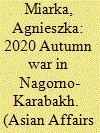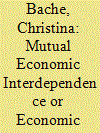|
|
|
Sort Order |
|
|
|
Items / Page
|
|
|
|
|
|
|
| Srl | Item |
| 1 |
ID:
183183


|
|
|
|
|
| Summary/Abstract |
The article aims to analyze the autumn war in the Nagorno-Karabakh region, which took place in 2020, and explain its impact on the strategic balance of power in the South Caucasus region. This issue is important for regional security and power projection in the South Caucasus. The author focused on 1) The characteristics of the course of the war; 2) The impact of the war on the politics of Armenia and Azerbaijan; 3) The impact of the war on the new division of the sphere of influence between Russia and Turkey. In the course of the research, research techniques and methods characteristic of political science and security science (neoclassical realism paradigm) were used, including critical analysis of the literature on the subject, analysis of policy makers' statements, secondary analysis, and interpretation of quantitative data.
|
|
|
|
|
|
|
|
|
|
|
|
|
|
|
|
| 2 |
ID:
159235


|
|
|
|
|
| Summary/Abstract |
This article concentrates on the deepening of Ankara-Erbil relations, with a specific focus on the presence of the Turkish private sector in the Kurdistan Region of Iraq (KRI) between 2004 and 2014. During that period, the Kurdistan Regional Government (KRG) failed to implement important structural reforms to diversify the economy and ensure economic stability. The absence of a strong local private sector, independent from government-led economic activity, hindered the potential for the region to become completely self-reliant. Due to the liberal economic framework and insufficient government capacity to oversee private sector operations, foreign corporations could operate in the area without deliberately contributing to the long-term socioeconomic development of the KRI. For the viability of South Kurdistan, the KRG must require foreign corporations operating in the KRI to move beyond simple ‘do no harm’ approaches and actively engage in conflict sensitive practices including inclusive business practices, sustainable human resource management, environmental sustainability, human capital development, and social investments.
|
|
|
|
|
|
|
|
|
|
|
|
|
|
|
|
| 3 |
ID:
156913


|
|
|
|
|
| Summary/Abstract |
This article analyzes combatants’ accounts of their engagement with the Communist Party of Nepal, Maoist—CPN (M). We use Self-Categorization Theory (SCT) as a framework and thematic analysis as a method to examine how social relationships and contextual factors contributed to political party identification during the ten-year-long Maoist insurgency in Nepal. Based on the study of autobiographical narratives written by Nepali Maoist combatants, we demonstrate that a) key social and political experiences cumulatively evoked feeling positively inclined to partisan attachment; b) CPN (M) party ideology, which was presented as a cure-all to socio-political difficulties, actuated the predisposed people’s partisan alignment; c) families were largely unsupportive of their members’ intention to take part in the war; and when they participated, the family responded with antagonism; and d) party ideologues of the CPN (M), who met the partisan-leaning individuals as close friends, accelerated and sustained their friends’ motivation to become involved in the armed conflict. Together the findings culminate in a view that engagement with CPN (M) during the insurgency occurred despite resistance from family and increased exponentially because of societal and political experiences, the strong appeal of party ideology, and social network dynamics.
|
|
|
|
|
|
|
|
|
|
|
|
|
|
|
|
|
|
|
|
|